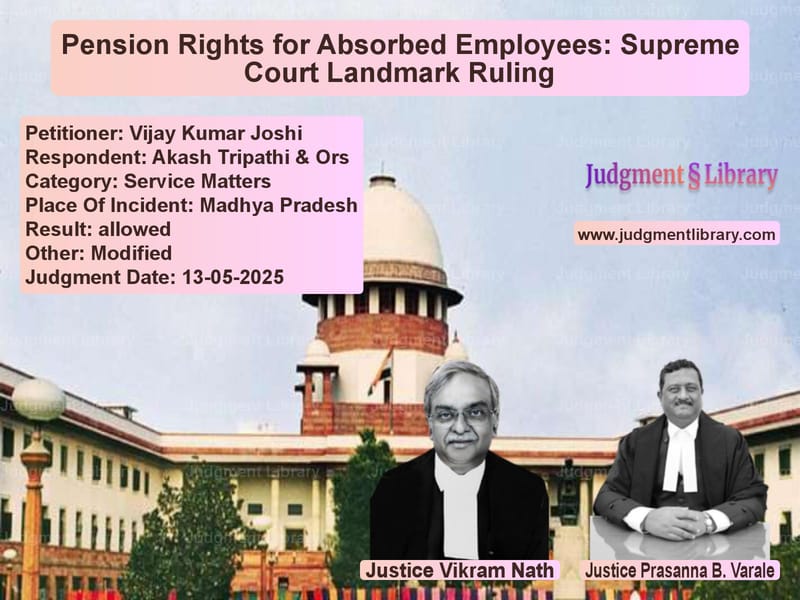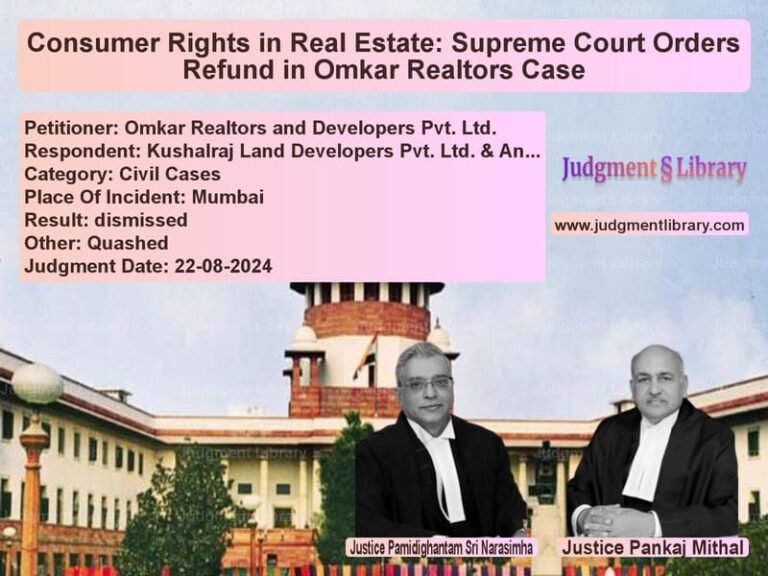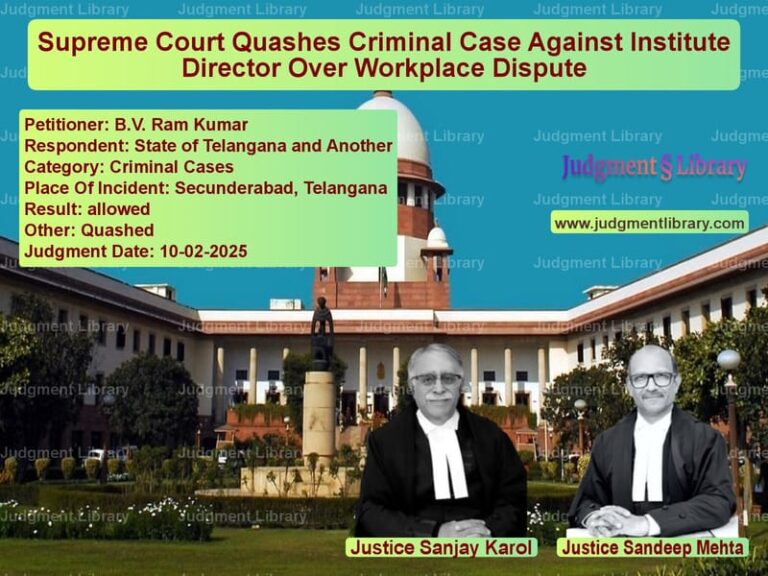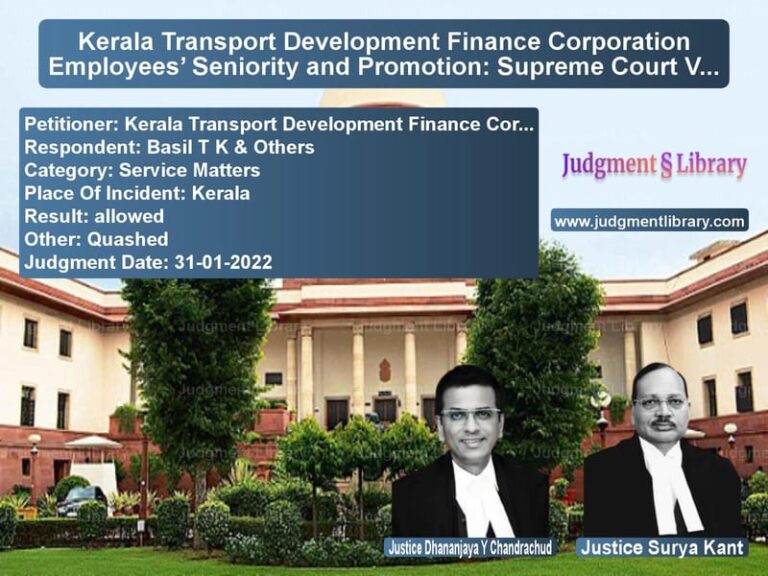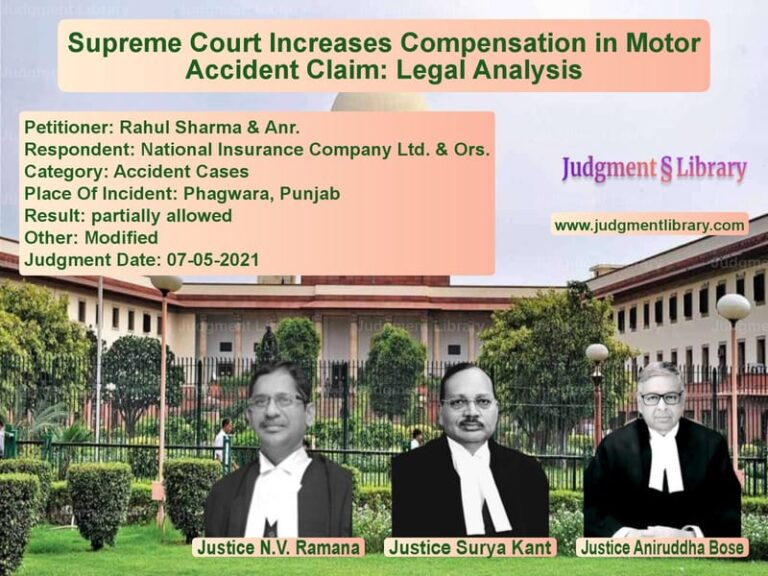Pension Rights for Absorbed Employees: Supreme Court Landmark Ruling
Imagine working for an organization for years, contributing your skills and time, only to find that when your organization merges with a larger entity, your service benefits are in jeopardy. This was the reality faced by hundreds of employees of cooperative electricity distribution societies in Madhya Pradesh when their societies merged with the Madhya Pradesh State Electricity Board (MPSEB). What followed was a complex legal battle that spanned nearly two decades, involving multiple court cases, conflicting judgments, and ultimately reaching the Supreme Court of India. The central question was simple yet profound: when employees are absorbed into a new organization after a merger, are they entitled to the same pension benefits as existing employees, and should their previous service count toward their pension eligibility?
The Background of the Case
In the state of Madhya Pradesh, numerous cooperative societies were registered and involved in the work of electricity distribution across different areas. Over time, the financial health of these societies deteriorated, making them unable to effectively manage their operations. In 1995, a policy decision was taken to merge these societies with the MPSEB. This decision finally materialized in 2002 when the societies were dissolved and formally merged with effect from March 15, 2002, with subsequent notifications issued by MPSEB in May and December 2004.
The terms and conditions for absorption were formulated and declared by MPSEB in its order dated June 5, 2004. These terms became the cornerstone of the subsequent legal dispute. Clause 5 of these terms specifically stated: “Pension/gratuity will be payable to the employees absorbed in the Board as per the rules/regulations of the concerned society.” This clause would become the focal point of contention in the years to come.
The Legal Journey Begins
Soon after the absorption, the employees’ union, Bijli Karamchari Sangh (BKS), filed a writ petition in 2005 challenging the orders issued by the Regulatory Commission related to the merger and absorption. They sought the same benefits as the regular employees of MPSEB. During the pendency of this petition, another petition was filed by Panchraj Tiwari, which eventually reached the Supreme Court and resulted in a judgment dated March 4, 2014, where Clauses 3 and 6 of the absorption terms were found unsustainable.
Subsequently, on March 7, 2015, the writ petition filed by BKS was decided, with the court directing that “the respondents are directed to extend the pensionary benefits and other fringe benefits to the absorbed employees who are now the employees of M.P. State Electricity Board.” This judgment was challenged by MPSEB before the Division Bench, which dismissed their appeal on June 14, 2016. MPSEB then approached the Supreme Court through a Special Leave Petition, which was dismissed on November 30, 2018, and their review petition was also dismissed on April 23, 2019.
The Full Bench Reference and Conflicting Judgments
Meanwhile, multiple individual proceedings were initiated by employees claiming various reliefs related to their merger with MPSEB. In April 2019, a Single Judge disposed of a bunch of petitions and directed that “The petitioners shall be entitled to get the benefit of pensionary scheme and other fringe benefits, which are applicable for the employees of M.P.S.E.B. as per the judgment of Indore Bench in W.A. No. 334/2015.”
Aggrieved by this judgment, MPSEB filed a bunch of writ appeals. The Division Bench, disagreeing with the judgment in Writ Appeal No. 334 of 2015, referred the matter to a larger Bench to adjudicate two crucial questions: whether the decision holding that employees of the society were entitled to pension laid down the correct law, and whether the employees were entitled to pension benefits as claimed by them or were governed by the absorption terms which provided for payment of pension/gratuity as per the rules and regulations of the concerned society.
The Full Bench, in its impugned judgment dated August 22, 2019, held that the earlier Division Bench judgment in Writ Appeal No. 334 of 2015 did not lay down the correct law and that the employees of the societies absorbed with MPSEB would not be entitled to pension as applicable to regular employees of MPSEB but would be governed by the rules and regulations of the Society.
The Supreme Court’s Analysis
The Supreme Court, comprising Justices Vikram Nath and Prasanna B. Varale, noted the complexity that had arisen due to the long duration of litigation and multiplicity of proceedings. The Court observed that while the litigation initiated by BKS had attained finality up to the Supreme Court much prior to the Full Bench judgment, other employees faced the prospect of being denied pension benefits entirely based on the Full Bench decision.
The Court invoked its power under Article 142 of the Constitution of India to ensure complete justice and prevent disparity and discrimination among similarly situated employees. The judges emphasized that “It would be wholly unjust to deny pension benefits to the absorbed employees when they are performing the same duties and discharging the same responsibilities as other MPSEB employees.”
The Court relied heavily on its earlier judgment in Panchraj Tiwari vs. Madhya Pradesh State Electricity Board and Others (2014), where it was held that “Once a service is merged with another service, the merged service gets its birth in the integrated service and loses its original identity. There cannot be a situation, where even after merger, absorption or integration, such services which were merged or absorbed, still retain their original status. If so, it is not an absorption or merger or integration, it will only be a working arrangement without any functional integration.”
Read also: https://judgmentlibrary.com/supreme-court-upholds-teachers-appointment-in-caste-category-dispute/
This principle was further reinforced in subsequent cases, including M.P. Poorva Kshetra Vidyut Vitaran Co. Ltd v. Uma Shankar Dwivedi and Brajendra Singh Kushwah & Ors v. M.P. State Electricity Board and Ors., where the State had accepted the legal position of extending benefits to absorbed employees from the date of absorption.
The Court’s Reasoning on Pension Entitlement
The Supreme Court made a crucial distinction between entitlement to pension and the calculation of qualifying service. On the question of entitlement, the Court was unequivocal: “We therefore hold that all the absorbed employees would be entitled to pension in the peculiar facts and circumstances of the present case.”
The Court strongly condemned the possibility of creating two classes of employees within the same organization, stating that “there cannot be two classes of employees in the same organisation. One set with pension and the other without pension. In such circumstances, denying them the benefit of pension solely on the ground of their origin in the societies would amount to unjust discrimination.”
However, on the question of whether the qualifying period for pension should be calculated from the date of joining the Society or from the date of absorption into MPSEB, the Court took a different view. Examining the Madhya Pradesh Civil Services (Pension) Rules, particularly Rule 3(p) which defines ‘qualifying service’ as “the period between the date of joining pensionable service under the State Government and retirement therefrom,” and Rule 12(2) which states that “qualifying service of a Government servant shall commence from the date he takes charge of the post to which he is first appointed either substantively or in an officiating or temporary capacity,” the Court concluded that service rendered in the Society prior to absorption could not be counted toward pension eligibility.
The Court explained: “In view of the above, while the appellants are held entitled to pension from the MPSEB, the period of service rendered in the Society prior to absorption cannot be counted. This is for the reason that such service was not under the State Government, and was not governed by its rules. The appellants would thus be eligible for pension from the date of their absorption into MPSEB, from which point they became employees governed by State rules.”
The Final Judgment and Directions
In its final ruling, the Supreme Court allowed the appeals to the extent that the appellants shall be paid pension by MPSEB with effect from their respective dates of absorption. The Court modified the impugned orders accordingly and directed the respondents to implement these directions within a period of four months and pay all arrears of pension within the same timeframe.
This judgment represents a significant victory for the absorbed employees, ensuring they receive pension benefits comparable to their MPSEB counterparts, while also establishing important legal principles regarding the rights of employees in merger and absorption scenarios.
Broader Implications of the Judgment
The Supreme Court’s decision has far-reaching implications for similar cases across the country where employees of merged or absorbed entities face uncertainty about their service benefits. The judgment reinforces the principle that true absorption or integration means complete functional integration, where the absorbed employees must be treated on par with existing employees of the absorbing organization.
However, the judgment also acknowledges the limitations in counting pre-absorption service toward pension eligibility when such service was not under the same government rules and regulations. This balanced approach ensures fairness to both employees and the absorbing organization while maintaining the integrity of service rules.
The case also highlights the importance of the Supreme Court’s power under Article 142 of the Constitution to do complete justice in complex situations where multiple proceedings and conflicting judgments have created inequitable outcomes for similarly situated individuals.
For thousands of employees who had dedicated their careers to public service, only to face uncertainty about their retirement security, this judgment brings much-needed clarity and justice. It establishes that while their past service may not count toward pension calculations, their right to pension itself cannot be denied once they become part of the integrated organization.
The resolution of this nearly two-decade-long legal battle serves as a reminder of the judiciary’s role in protecting the rights of employees and ensuring that organizational restructuring doesn’t come at the cost of workers’ legitimate entitlements. It strikes a careful balance between the practical constraints of integrating different service rules and the fundamental principle of equal treatment for equal work.
Petitioner Name: Vijay Kumar Joshi.Respondent Name: Akash Tripathi & Ors.Judgment By: Justice Vikram Nath, Justice Prasanna B. Varale.Place Of Incident: Madhya Pradesh.Judgment Date: 13-05-2025.Result: allowed.
Don’t miss out on the full details! Download the complete judgment in PDF format below and gain valuable insights instantly!
Download Judgment: vijay-kumar-joshi-vs-akash-tripathi-&-ors-supreme-court-of-india-judgment-dated-13-05-2025.pdf
Directly Download Judgment: Directly download this Judgment
See all petitions in Pension and Gratuity
See all petitions in Employment Disputes
See all petitions in Public Sector Employees
See all petitions in Judgment by Vikram Nath
See all petitions in Judgment by Prasanna Bhalachandra Varale
See all petitions in allowed
See all petitions in Modified
See all petitions in supreme court of India judgments May 2025
See all petitions in 2025 judgments
See all posts in Service Matters Category
See all allowed petitions in Service Matters Category
See all Dismissed petitions in Service Matters Category
See all partially allowed petitions in Service Matters Category

